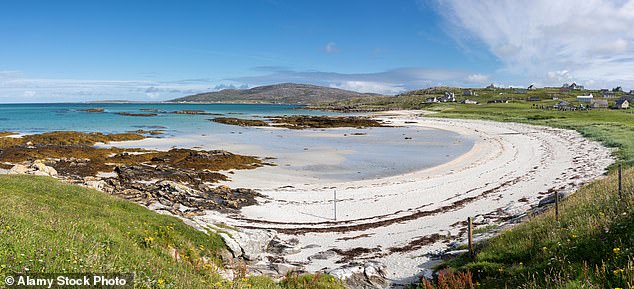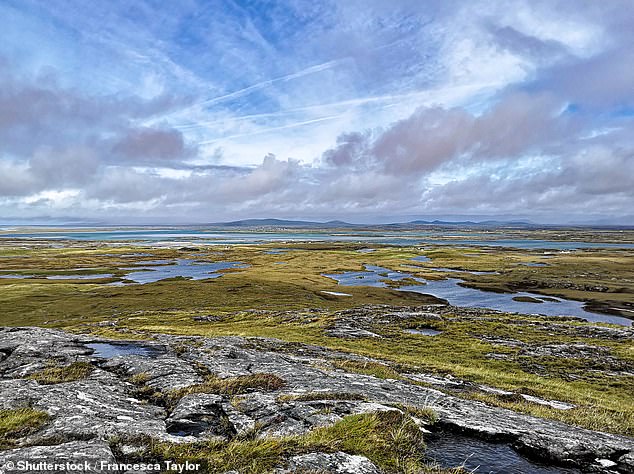Health chiefs are trying to lure GPs to work in one of Scotland’s most idyllic locations, with the promise of a £150,000 salary.
In a new effort to solve a recruitment crisis in the remote Outer Hebrides, GPs will also be offered a relocation package and a £10,000 golden handshake plus 41 days of annual leave.
NHS Western Isles bosses want to attract five new GPs to Uist and Benbecula with this tempting deal, aimed at doctors who want to “escape the rat race and practice medicine in an idyllic setting”.
The Outer Hebrides, about 50 miles and a two-hour ferry ride from mainland Scotland, are famous for their white sand beaches and stunning scenery.
The role is based at a practice in Benbecula, but GPs are also expected to work at the local 17-bed community hospital.
Your browser does not support iframes.

NHS Western Isles bosses want to attract five new GPs to Uist (pictured) and Benbecula with this tempting deal, aimed at doctors who want to “escape the rat race and practice medicine in an idyllic setting”.
According to the lucrative offer, the salary includes an “enhanced rate” of 40 percent on top of the normal salary. Salary range of £69,993 to £104,469 for salaried Scottish GPs.
This means new GPs could be paid up to around £147,500 a year.
Health bosses are also offering an “annual outlying island allowance” of £1,279 a year and up to £8,000 towards relocation costs.
The advert reads: ‘From the fishing port of Lochmaddy in the north; As well as the sparkling beaches of Lochboisdale in the south, the islands of Uist and Benbecula offer a warm welcome and are bursting with life, activity and culture.
‘It is in this unique, safe and idyllic location that a rare and exciting opportunity has arisen for at least five GPs to form a new team as part of a new medical practice.
“We are ready and excited to welcome GPs with a sense of adventure and passion for remote and rural medicine to escape the rat race and embrace a healthier work-life balance.”
He added that the island is “dotted with lakes and lagoons, endless seas and spectacular seascapes and surroundings.”
Benbecula Medical Practice, which cares for more than 2,000 patients, has had “ongoing challenges” recruiting GPs.
In October, the health board announced it would take over management of the practice from April this year, after a GP retired.
The two remaining partners plan to continue working in the practice, but in paid positions.
The recruitment challenges facing the health board have been attributed to rising house prices, driven by a rise in properties being converted into second homes and wealthy retirees settling in the area.
GPs have also previously complained that surgeries They are in poor condition and narrow.
NHS Western Isles medical director Dr Frank McAuley said they are offering at least five GPs the chance to “escape the rat race”.
He added: “These roles will appeal to experienced GPs, but also those who are at earlier stages in their careers and are looking for the challenge of expanding their clinical skills and providing comprehensive care in a remote but supported environment.”
“These are roles that present excellent opportunities for skills and confidence development, and the remote island location provides an extra sense of responsibility and unrivaled reward.”
Meanwhile, Gordon Jamieson, chief executive of NHS Western Isles, told BBC Radio’s Good Morning Scotland programme: “There has to be a certain type of person who wants that job and that responsibility.”
He acknowledged NHS Western Isles had faced a “wide range of challenges” in rural recruitment.
But he believes the salary is an incentive to “live, work and stay here.”


Benbecula Medical Practice, which cares for more than 2,000 patients, has had “ongoing challenges” recruiting GPs. In October, the health board announced it would take over management of the practice from April this year, after a GP retired. In the photo, Benbecula Island.
Your browser does not support iframes.
He added: “We want a sustainable service and we want people to live in the community for a long time.”
GPs have long complained that they are overwhelmed due to the pressures of a growing and aging population and a lack of government funding.
Family doctors have reported making up to 90 appointments per day, a situation comparable to that of a conveyor belt.
Under recommendations put in place by the BMA and the European General Practitioners Union, GPs in the UK today should make no more than 25 appointments a day to ensure “safe care”.
Patient satisfaction has also fallen to its lowest level in four decades.
According to the 2023 GP Patient Survey, a survey of 759,000 Brits, only seven in ten (71.3 per cent) described their overall experience with their GP practice as ‘good’ overall. Satisfaction has fallen to an all-time low.
Less than half of patients (49.8 percent) also said they find it easy to contact their GP by phone, down from 52.7 percent in 2022 and 80.8 percent in 2012.
